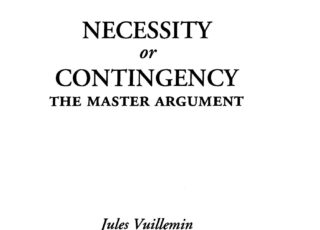Colebrook, Sex After Life
Sex After Life aims to consider the various ways in which the concept of life has provided normative and moralizing ballast for queer, feminist and ...
Continue Reading →Cohen, Twilight of the Anthropocene
Following on from Theory and the Disappearing Future, in Twilight of the Anthropocene Idols, Cohen, Colebrook and Miller turn their attention to the eco-critical and ...
Continue Reading →Ahmed, What’s the Use
In What’s the Use? Sara Ahmed continues the work she began in The Promise of Happiness and Willful Subjects by taking up a single word—in ...
Continue Reading →Hester, Xenofeminism
In an era of accelerating technology and increasing complexity, how should we reimagine the emancipatory potential of feminism? How should gender politics be reconfigured in ...
Continue Reading →Moivre, The Doctrine of Chance
The Doctrine of Chances was the first textbook on probability theory, written by 18th-century French mathematician Abraham de Moivre and first published in 1718.[1] De ...
Continue Reading →Zafiris, Natural Communication: The Obstacle-Embracing Art of Abstract Gnomonics
New paths in complexity science In Natural Communication, the author criticizes the current paradigm of specific goal orientation in the complexity sciences and proposes an ...
Continue Reading →Bayes, An Essay towards solving a Problem in the Doctrine of Chances
An Essay towards solving a Problem in the Doctrine of Chances is a work on the mathematical theory of probability by Thomas Bayes, published in ...
Continue Reading →Palmer, Queer Defamiliarisation: Writing Mattering Making Strange
Helen Palmer examines the Russian formalist concept of defamiliarisation, or making-strange, from a contemporary critical perspective, bringing together new materialist feminisms, experimental linguistic formalism and ...
Continue Reading →Bernoulli,The Art of Conjecturing
Jacob Bernoulli’s Ars Conjectandi, published posthumously in Latin in 1713 by the Thurneysen Brothers Press in Basel, is the founding document of mathematical probability. Here, ...
Continue Reading →Grassmann, Extension Theory
The Ausdehnungslehre of 1862 is Grassmann’s most mature presentation of his “extension theory”. The work was unique in capturing the full sweep of his mathematical ...
Continue Reading →Most liked books

Kretzer, Synthetic Realities
March 14, 2025
Vuillemin, Necessity or Contingency
February 25, 2025Recent Comments
Categories
- _English Language 1447
- _French Language 55
- _German Language 69
- _Italian Language 54
- _Latin Language 45
- 1750-1850 64
- 17th Century 77
- 17th culture and other cities in Italy 5
- 19th century 45
- 20th Century 151
- 21th Century 75
- Aesthetics 5
- Afrofuturism 3
- Ancient Literature 37
- Anthropocene 1
- Anthropology 3
- Architectural Theory 224
- Architecture + Philosophy 37
- Architecture and Literature, Symbolism 36
- Art 13
- Art Theory 110
- Artificial Intelligence 11
- Artists in Rome 20
- Astronomy 2
- Autobiography 1
- Bernini 19
- Biology 5
- Catalogue 2
- Christian Iconography 18
- Christianity 13
- Cinema 2
- City 45
- Classical 1
- Construction 1
- Contemporary 2
- Design 29
- Digital Architectonics 26
- Drawings 41
- Economy 31
- Empire, Architecture + Catholicism 14
- England & British Isles 26
- Enlightenment Library 127
- Evolution 6
- Fashion 6
- Feminism 20
- Film Festival 1
- France 47
- Gender and Sexuality Studies 5
- Gothic 13
- Greek, Roman Library 99
- Historiography 43
- Humanism 12
- India 5
- Islam 5
- Italy 80
- Landscape Architecture 8
- LGBT 1
- Libraries 0
- Linguistics 6
- Literary Criticism 11
- Literary Theory 82
- Literature 95
- Low Countries (Benelux) 14
- Mathematics 61
- Medicine 4
- medieval library 38
- medieval literature 12
- Modern 51
- Monuments + Conservation 27
- Music Theory 1
- Mysticism 4
- Mythology 19
- Nature, Ecology, Animals 4
- Neurobiology 1
- Opera 5
- Philosophy 346
- Physics 16
- Poetry 6
- Politics 76
- Popes, Vatican, Rome 27
- Portrait, Sculpture, Materiality 56
- Post-Modern 22
- Programming 2
- Psychology 22
- Religion 23
- Renaissance 86
- Renaissance Library 80
- Rhetorics 1
- Roman Architecture 21
- Rome 122
- Schinkel 8
- Science 57
- Sociology 21
- Sound 7
- Sources 56
- Spain 10
- Switzerland 48
- Uncategorized 73
- Urbanism 53
